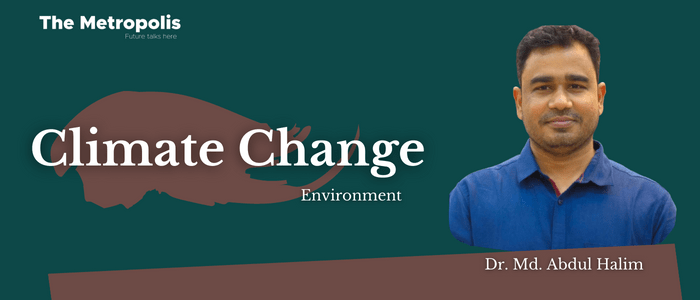Bangladesh is one of the most climate-vulnerable countries in the world and frequently experiences natural calamities due to its low elevation. Sea-level rise, changes in the duration as well as the timing of monsoons, and extreme heat plus cold waves largely control the way of living in the country. Coastal populations are particularly vulnerable to these extreme climate events, which are rapidly becoming deplorable. Mass migration from rural to urban areas in search of better lives and livelihoods has become common among climate-vulnerable populations.
Bangladesh is an agrarian country, and climate change impacts the country’s long- and short-term food security. Crop variety improvement, chemical fertilizers, and pesticide application are some common strategies for enhancing crop production. Chemical fertilizers emit highly potent greenhouse gases such as carbon dioxide, methane, and nitrous oxide. A high dosage of chemical fertilizers will likely be used in the future to meet growing food demand, making agricultural lands a hotspot of greenhouse gas emissions. Fertilizers also pollute groundwater, severely threatening drinking water sources and aquatic ecosystems. Moreover, due to a shift in the duration and timing of the monsoon, agriculture is gradually becoming highly irrigation dependent, making farming a more capital-intensive venture.
In a similar vein, the country’s remnant forests (approximately 11 percent cover) are rapidly dwindling due to increasing anthropogenic pressure and climate impacts. The way forests are managed impacts the way forests interact with climate and vice versa. Common forest management strategies of Bangladesh, such as logging ban and co-management initiatives, are seemingly struggling to protect the forest cover and biodiversity of the country. On top of that, forest dwellers highly depend on forests for resources like fuelwood. While it is unrealistic to stop people from collecting fuelwood without offering them appropriate alternatives, it is critical to understand that fuelwood not only removes biomass carbon from forests but also releases it into the atmosphere.
Climate-smart Forest is a current sustainable forest management trend for maximizing climate benefits. Bangladesh has been working on reducing greenhouse gas emissions from forests via the REDD+ mechanism. The mechanism can offer maximum climate benefits if the national carbon pool is accurately estimated. Our current static measurement of total carbon in forest soils is insufficient to delineate the capacity of the national carbon pool. Carbon in the soil is more volatile than we might think; any disturbance altering the micro-environment may cause rapid carbon loss, primarily through carbon dioxide and methane. Conversely, soil can also absorb atmospheric methane, as was observed in my research conducted in the Lawachara National Park.
Adaptation and mitigation are the two most common responses to climate change. Adaptation is the action that minimizes the adverse effects of climate. Mitigation, on the other hand, is a measure to reduce climate change. Mitigation and adaptation largely depend on strategies for greenhouse gas emissions, innovation technologies, and management policies and strategies. Here I explore the feasibility of biochar – pyrolyzed biomass used as a soil amendment – as a potential tool to adapt to and mitigate climate impacts in the agriculture and forest sectors of Bangladesh.
Biochar is a type of charcoal produced from low-oxygen combustion of biomass at a temperature of more than 300-degree Celcius. It generally improves soil alkalinity, positive ion exchange capacity, water holding capacity, and phosphorus and potassium contents. The first record of biochar usage dates back more than 8 thousand years by the Amazonian civilizations to enhance soil fertility. Recent research shows that biochar can effectively ameliorate degraded soil, improve soil fertility and water-holding capacity, and reduce greenhouse gas emissions. Since biochar can be produced low-tech at a meager cost from any organic materials, it can help mitigate and adapt to climate change effects sustainably in Bangladesh.
Biochar can effectively amend agricultural soils to reduce fertilizer and irrigation requirements, groundwater pollution, and greenhouse gas emissions from agricultural lands. In combination with nitrogen-fixing plants and biochar treatment, re-cultivation of southern saline soils of the country is also possible. Due to its high adsorption capacity, biochar can retain nutrients in the soil for a long time, bind heavy soil elements, and reduce salinity. Recent research has shown that biochar directly adds carbon to the soil and can reduce greenhouse gas emissions.
A low-cost biochar stove can be popularized among forest dwellers as an alternative to fuel wood burning. Biochar produced as a by-product from cooking can improve the fertility of home garden soils while trapping carbon in and around the forests. It can also be effectively utilized for reforestation in the degraded and deforested areas of the country. Research shows that plant growth is much higher in biochar-treated soils. Since Biochar can stay in the soil for more than a thousand years, it can be an excellent way to add and store carbon to the soil.
Moving on, syngas (a fuel mixture) produced as a by-product of biochar can be used to generate electricity, which is being marketed as “green electricity” in many countries. However, biochar produced in private micro-stoves may not be carbon neutral. An accurate estimate of net carbon gain is required to advise on biochar applications in various systems.
Finally, biochar is not a panacea that can be used definitively to solve all problems related to agriculture and forest ecosystems. Its most effective use is still under research. We need to identify the type of biochar appropriate for the soils of Bangladesh. This requires collective efforts. As the first and foremost victims of climate change, we need to play a persuasive role in finding appropriate measures to reduce our carbon footprint and adapt to climate change impacts.
Dr. Md. Abdul Halim is a Post-Doctoral Research Fellow at the Department of Forestry at the University of Toronto in Canada



